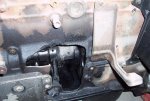- 820
- 858
- 93
- Location
- W.WA
So, aside from problems with the injector, my deuce has really done well by me. I've put a few thousand miles on it and driven it over the Cascade Mts. 5 times now.
I'm making a few changes with the idea of going on some serious, potentially months (years?) long trips. Is there something(s) I should I should consider replacing that maybe I've just been lucky about up to now?
I'm making a few changes with the idea of going on some serious, potentially months (years?) long trips. Is there something(s) I should I should consider replacing that maybe I've just been lucky about up to now?


